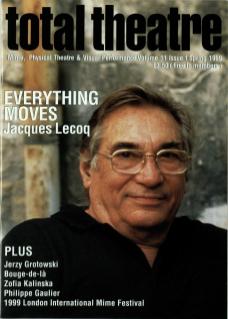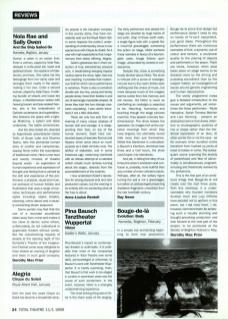Pina Bausch's impact on contemporary theatre is undeniable. It is probable that most of the companies featured in Total Theatre owe some debt, acknowledged or otherwise, to Bausch's work with Tanztheater Wuppertal. It is hardly surprising, then, that Bausch's first work to be staged in London in seventeen years was the cause of such excitement. In the event, however, Viktor is a strangely underwhelming experience.
The most striking thing about Viktor is the sheer scale of the staging. The thirty performers who people the stage are dwarfed by huge banks of red earth. Atop these earth walls, a single figure toils with a spade like a mournful gravedigger, overseeing the action on stage. Viktor eschews linear narrative in favour of a less tangible order. Image follows upon image, unbounded by context or consequence.
Despite this, there is something fondly familiar about Viktor. The show is imbued with a sense of nostalgia, not just due to the cast's forties-style clothing and the choice of music, but more because much of the imagery seems culled from folk memory and old movies. Yet Viktor is never as comforting as nostalgia is expected to be. Haunting, humorous and touching though the stage pictures could be, they appear curiously two-dimensional. The show teases the spectator; its images hint at the narrative moorings from which they have slipped, but ultimately reveal little more than just themselves. Whilst this blankness is undoubtedly Bausch's intention, stretched over three and a half hours, the show could lapse into blandness.
And yet, in telling the story of our times, the show's kineticism and confusion is, probably, more truthful than any number of more coherent pieces. Perhaps, after all, the solitary figure turning the soil is not a gravedigger, but rather an archaeologist presenting shattered fragments unearthed from the late twentieth century.

